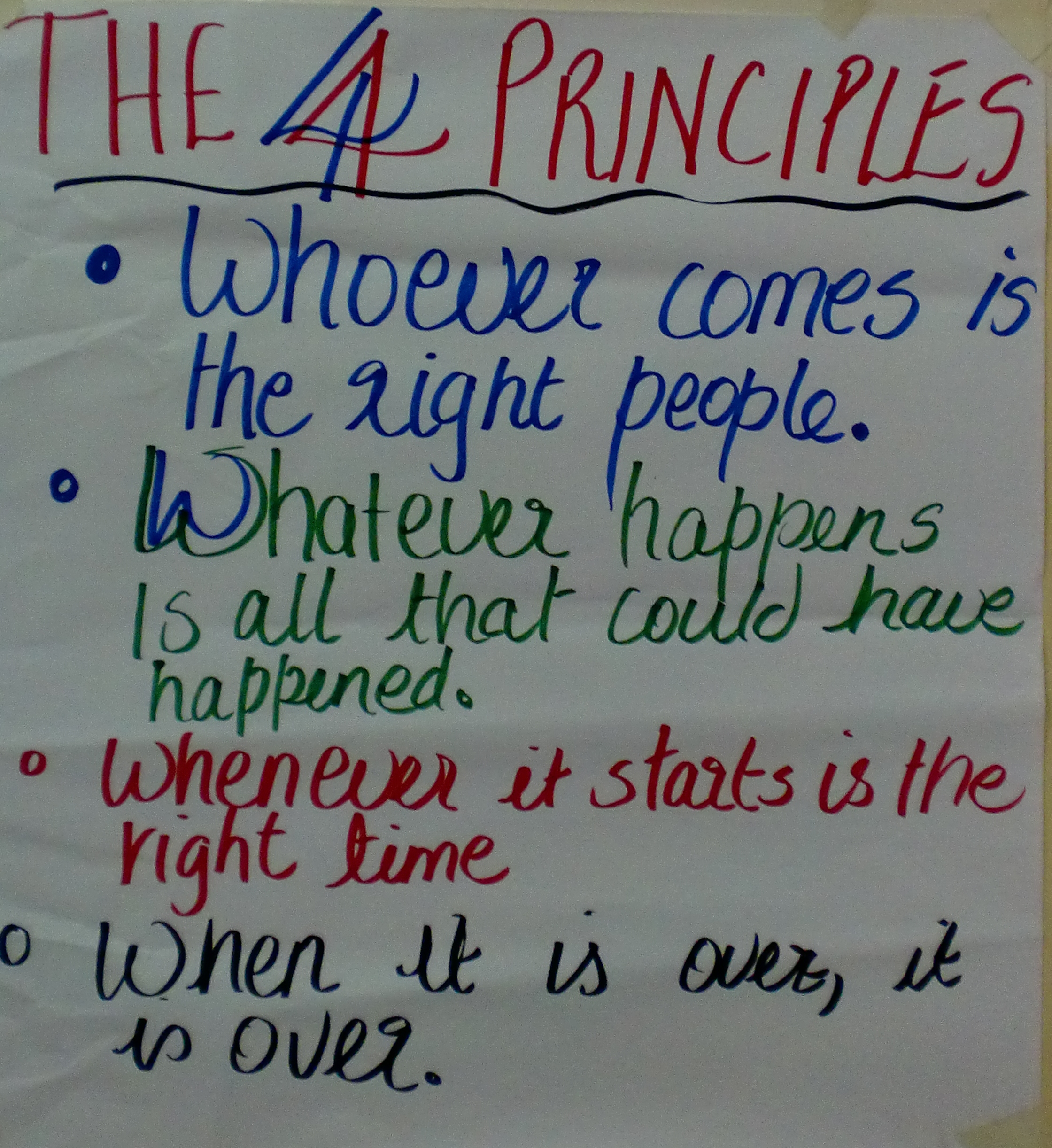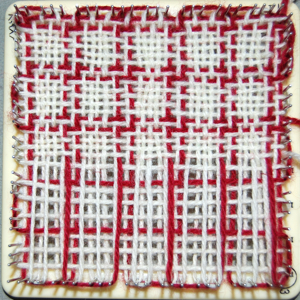As a facilitator, when I have facilitated, what have I done? What happened to me?
- I have thought
- I have met with each and every one in the group
- I have paid attention
- I have been sensitive to people and the atmosphere in general and in particular
- I have spoken - talked with and to participants
- I have exercise Heart skills - whatever people think it is - using my heart
- I have introspected
- I have shared - shared from the heart too
- I have been surprised, amused, entertained,...
- I have been worried, felt out of my comfort zone
- I have spoken at the first person, ie taking responsibility for what I felt as well as for what I am saying
Is that so? So be it :-)
Showing posts with label Facilitation. Show all posts
Showing posts with label Facilitation. Show all posts
Tuesday, April 3, 2012
Saturday, September 4, 2010
Open space facilitation

Great, authentic sharing about practical 'Open space' facilitation:
Open space technology is an ‘innovation’ that has been created to provide a forum for development stakeholder interaction. It works by breaking away from the stilted western influenced ‘one-man shows’ where an ‘expert’ occupies a position of power, usually on a raised dais with, the others sitting in a square or semi triangular shape below him. In open space there is no boss and the no real rules of interaction. The format is meant to ensure everyone is able to interact with everyone else.
First the people sit in a circle.
There is a minimum of ceremony. The gathered people start by identifying the key issues that have brought them together. If several issues are identified then the circle will break into several smaller circles to discuss each of them and suggest solutions. A closing circle will later be created to bring all this input together. Everybody who wants to speak has a chance to do so. There are no titles here, no affectations and no honorifics. The cleaner sits shoulder to shoulder with the manager and the driver surprises everybody by her well reasoned and animated contributions. It is amazing how much openness and trust this simple but powerful tool brings.
Open space technology was created by Owen Hanson in the 1980’s as a methodology for conducting meetings. He acknowledges that, in developing the methodology, he was influenced by ‘his experience of life in an African village.’
Learning and facilitation. How to learn? How to teach? How to reach
It seems to me: learning how to teach is learning how to reach
I am impressed by the following metaphor when it comes to learning, reaching and reaching out: infusion / waiving. In future posts, I will elaborate on the analogies between these seemingly very different fields.
Infusion:
how to let a subject infuse? penetration, penetrability, diffusion, time and space of contact, mixing without disturbing, blending, getting the flavor, getting the essence...
Pictures below can help relate and bring us a little step further in elaborating a clearer notion of an "infusion-based learning and facilitation"




Waiving
The long process(es) - creating thread, dying, weaving, the shuttle, going up and down, the science involved (it is very exact in a way - it goes thread by thread - and if not exact, it will look awkward) , the long, gruesome, time-consuming practice of it and how it is learnt (passed on from mother to daughter - as some form of apprenticeship - and how it often reflects on someone's maturity level or level of preparedness - like in the case of a young bride who is completing her own work or tapestry, or as a matter of fact it could be batik though batik is not about weaving).
Buckminster Fuller in the Critical Path is making explicit allusion to weaving patterns of South East Asia and those weaving patterns that use tri-angular weaving (three points of contacts which make the pattern almost indestructible).






I am impressed by the following metaphor when it comes to learning, reaching and reaching out: infusion / waiving. In future posts, I will elaborate on the analogies between these seemingly very different fields.
Infusion:
how to let a subject infuse? penetration, penetrability, diffusion, time and space of contact, mixing without disturbing, blending, getting the flavor, getting the essence...
Pictures below can help relate and bring us a little step further in elaborating a clearer notion of an "infusion-based learning and facilitation"




Waiving
The long process(es) - creating thread, dying, weaving, the shuttle, going up and down, the science involved (it is very exact in a way - it goes thread by thread - and if not exact, it will look awkward) , the long, gruesome, time-consuming practice of it and how it is learnt (passed on from mother to daughter - as some form of apprenticeship - and how it often reflects on someone's maturity level or level of preparedness - like in the case of a young bride who is completing her own work or tapestry, or as a matter of fact it could be batik though batik is not about weaving).
Buckminster Fuller in the Critical Path is making explicit allusion to weaving patterns of South East Asia and those weaving patterns that use tri-angular weaving (three points of contacts which make the pattern almost indestructible).






Saturday, November 14, 2009
Facilitation - being in the now
Kiran and myself just facilitated a 1-day session. After the session, Kiran is sharing and reflecting with:
"Actually in the session being in the now, stepping back and inviting everyone to observe together what’s happening .. demonstrating our work.. 100% responsibility, deep listening, authentic speaking, questioning to evoke wonder and silence. Owning. Seeing how this is my mirror.. so seeking to understand.."
What a nice idea? Isn't it in fact - not just a nice idea - something of the essence? the essence of what our job - here - is about. What are we here to facilitate?
Clients do call us and do have aspirations for their own "internal" clients - the participants. It is sometimes about mixing few objectives together... sometimes it is about knowing each other better and bonding, sometimes it is about creating a positive experience, from which participants will not only bond but also feel motivated and may be stronger... Often it is also about dealing with, helping to solve some issues... Other times it may be about focusing on some specific business objectives and enabling participants to achieve these.
Alignment: Now to achieve that, to help participants achieve their objectives, it means that there is alignment between the participants in their teams, with their bosses or co-workers. There also need alignment between participants and trainers... Alignment between people is about respect, trust, and the ability to communicate and in particular to the ability to agree to disagree, while keeping faith in the objectives and in our ability to achieve them.
Any dysfunction in the team - some could say: any lack of integrity in almost any way - will at some point lead to a lack of alignment and/or to a lesser level of alignment: there may be various groups formed in the organisation and this may slow down, hamper the ability to deal with change, adapt, adopt new ways... there may be mis-trust - silently or up to the extent of defiance.... Of course there are various degrees of dysfunction but it is capital for the organisation to spot these areas which are dysfunctional and to start addressing them...
It is hard to imagine a very effective, high-performing team which is not well aligned: it seems important that participants are aligned - as person: trusting and respecting each other, able to communicate etc... - but also as the various links and chains of responsibility leading to the big picture. Therefore it must be a continuous balance and tension between aligning ourselves to the organisation's goals and addressing issues that may block or disturb the same process.
It seems to me that what Kiran is highlighting is precisely this. Seldome are the Human Capital consultants, trainers, given the luxury of time in their intervention. Dealing with business goals and issues like motivation, willingness to take responsibility, character building, integrity... may require many and separate interventions but isn't there a way of facilitation which is powerful enough, holistic enough to handle both personal, behavioural aspects together with organisational, business issues and objectives?
"stepping back and inviting everyone to observe together what’s happening .. demonstrating our work.. 100% responsibility, deep listening, authentic speaking, questioning to evoke wonder and silence."
Being in the now: that 's it... the now of any organisation .... dealing with this beautiful situation where anyone's attitude does have a direct impact on the business outcome... the nice dichotomy between individual behaviors and business outcome is convenient to theories because through compartementalisation it is easier to address issues one at a time.... Now, it is very unconvienent to business people because it all happens NOW... if the market requires this change to my product's positionning, I will take action now as required and will deal with whoever my team, my staff is at this time....
Therefore facilitators learn to handle people and tasks not as sets of challenge, but as one challenge... and therefore one opportunity... The opportunity is to make things work... which is what integrity is about. The conditions to face and ripe the opportunity is to tackel and address the conditions of integrity:
- 100% responsibility and keeping one's agreements in this context
- commitment to effective communication: emotional literacy, authentic speaking, resonant listening,
- commitment to trust and openness - especially openness to failure and mistakes
Among these 3 points, the easiest to achieve is the last: building trust and openess... It is also the most pressing and the most fondamental, as it will enable effective communication and willingness to take charge and own to it.
How do we build trust and openness in our facilitation? Maybe the participants become a mirror and the situation in the classroom mirrors what happens in the office. Maybe the challenges they - the participants - are facing become a mirror to the challenge we as facilitators are facing: what if we - participants - are tired, stressed? We feel pressurized... Nobody really listen to us at work.... Every new project is followed by another one, newer, more pressing and already overshadowing the last one.... therefore real efforts and focus seems less relevant, laughable almost... Now thisd is a bleak picture of someone's view of the office... but assuming some of it at least - is real, then... would not slugginesh, demotivation, cynicism, skepticism be at least understandable from some of the staff?
In any case, isn't it all the more important for the facilitator to show that he/she - as facilitator - operates from a platform of 100% responsibility and full integrity? If it is the case, then YES, it will be crucial during the training to - at some point - stop and observe: what is happening in the room? and how does it mirror some of the challenge we are facing? First: challenges as facilitator and trainees / participants? Second: challenges as staff and colleagues.
Facilitating and processing this reflective process will create trust and openess because it is showing
1- Willingness to learn from the facilitator and openness to the outcome of the training
2- Authenticity about the situation... dealing with the now ... facing reality rather than forcing outcome or discussions.
For the process to be succesful, it needs to be facilitated clearly and set in a context of listening and questionning: how are we functionning as a group now? describe... some keys to highlight and for participants to come up with examples could be: caring about the meeting outcome, caring about others in the meeting (this is the responsibility aspect), patterns of communication and understanding the source of it... , noticing and observing any obstacle to trust building...
"Actually in the session being in the now, stepping back and inviting everyone to observe together what’s happening .. demonstrating our work.. 100% responsibility, deep listening, authentic speaking, questioning to evoke wonder and silence. Owning. Seeing how this is my mirror.. so seeking to understand.."
What a nice idea? Isn't it in fact - not just a nice idea - something of the essence? the essence of what our job - here - is about. What are we here to facilitate?
Clients do call us and do have aspirations for their own "internal" clients - the participants. It is sometimes about mixing few objectives together... sometimes it is about knowing each other better and bonding, sometimes it is about creating a positive experience, from which participants will not only bond but also feel motivated and may be stronger... Often it is also about dealing with, helping to solve some issues... Other times it may be about focusing on some specific business objectives and enabling participants to achieve these.
Alignment: Now to achieve that, to help participants achieve their objectives, it means that there is alignment between the participants in their teams, with their bosses or co-workers. There also need alignment between participants and trainers... Alignment between people is about respect, trust, and the ability to communicate and in particular to the ability to agree to disagree, while keeping faith in the objectives and in our ability to achieve them.
Any dysfunction in the team - some could say: any lack of integrity in almost any way - will at some point lead to a lack of alignment and/or to a lesser level of alignment: there may be various groups formed in the organisation and this may slow down, hamper the ability to deal with change, adapt, adopt new ways... there may be mis-trust - silently or up to the extent of defiance.... Of course there are various degrees of dysfunction but it is capital for the organisation to spot these areas which are dysfunctional and to start addressing them...
It is hard to imagine a very effective, high-performing team which is not well aligned: it seems important that participants are aligned - as person: trusting and respecting each other, able to communicate etc... - but also as the various links and chains of responsibility leading to the big picture. Therefore it must be a continuous balance and tension between aligning ourselves to the organisation's goals and addressing issues that may block or disturb the same process.
It seems to me that what Kiran is highlighting is precisely this. Seldome are the Human Capital consultants, trainers, given the luxury of time in their intervention. Dealing with business goals and issues like motivation, willingness to take responsibility, character building, integrity... may require many and separate interventions but isn't there a way of facilitation which is powerful enough, holistic enough to handle both personal, behavioural aspects together with organisational, business issues and objectives?
"stepping back and inviting everyone to observe together what’s happening .. demonstrating our work.. 100% responsibility, deep listening, authentic speaking, questioning to evoke wonder and silence."
Being in the now: that 's it... the now of any organisation .... dealing with this beautiful situation where anyone's attitude does have a direct impact on the business outcome... the nice dichotomy between individual behaviors and business outcome is convenient to theories because through compartementalisation it is easier to address issues one at a time.... Now, it is very unconvienent to business people because it all happens NOW... if the market requires this change to my product's positionning, I will take action now as required and will deal with whoever my team, my staff is at this time....
Therefore facilitators learn to handle people and tasks not as sets of challenge, but as one challenge... and therefore one opportunity... The opportunity is to make things work... which is what integrity is about. The conditions to face and ripe the opportunity is to tackel and address the conditions of integrity:
- 100% responsibility and keeping one's agreements in this context
- commitment to effective communication: emotional literacy, authentic speaking, resonant listening,
- commitment to trust and openness - especially openness to failure and mistakes
Among these 3 points, the easiest to achieve is the last: building trust and openess... It is also the most pressing and the most fondamental, as it will enable effective communication and willingness to take charge and own to it.
How do we build trust and openness in our facilitation? Maybe the participants become a mirror and the situation in the classroom mirrors what happens in the office. Maybe the challenges they - the participants - are facing become a mirror to the challenge we as facilitators are facing: what if we - participants - are tired, stressed? We feel pressurized... Nobody really listen to us at work.... Every new project is followed by another one, newer, more pressing and already overshadowing the last one.... therefore real efforts and focus seems less relevant, laughable almost... Now thisd is a bleak picture of someone's view of the office... but assuming some of it at least - is real, then... would not slugginesh, demotivation, cynicism, skepticism be at least understandable from some of the staff?
In any case, isn't it all the more important for the facilitator to show that he/she - as facilitator - operates from a platform of 100% responsibility and full integrity? If it is the case, then YES, it will be crucial during the training to - at some point - stop and observe: what is happening in the room? and how does it mirror some of the challenge we are facing? First: challenges as facilitator and trainees / participants? Second: challenges as staff and colleagues.
Facilitating and processing this reflective process will create trust and openess because it is showing
1- Willingness to learn from the facilitator and openness to the outcome of the training
2- Authenticity about the situation... dealing with the now ... facing reality rather than forcing outcome or discussions.
For the process to be succesful, it needs to be facilitated clearly and set in a context of listening and questionning: how are we functionning as a group now? describe... some keys to highlight and for participants to come up with examples could be: caring about the meeting outcome, caring about others in the meeting (this is the responsibility aspect), patterns of communication and understanding the source of it... , noticing and observing any obstacle to trust building...
Subscribe to:
Posts (Atom)



